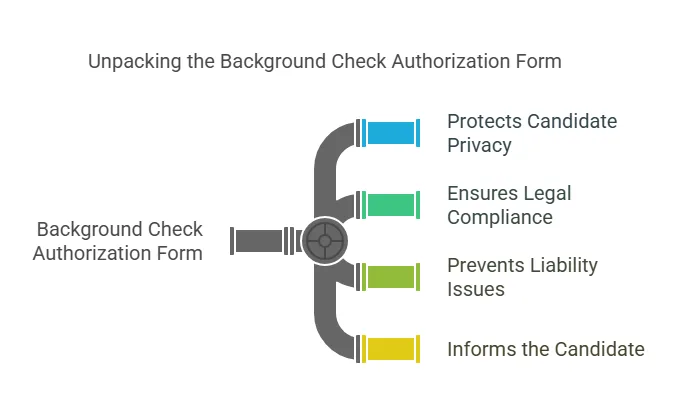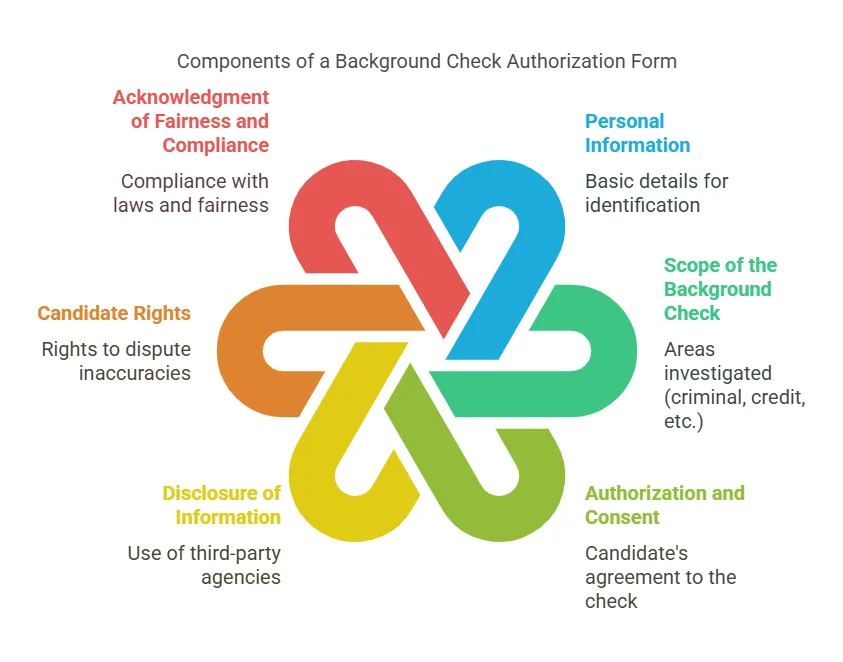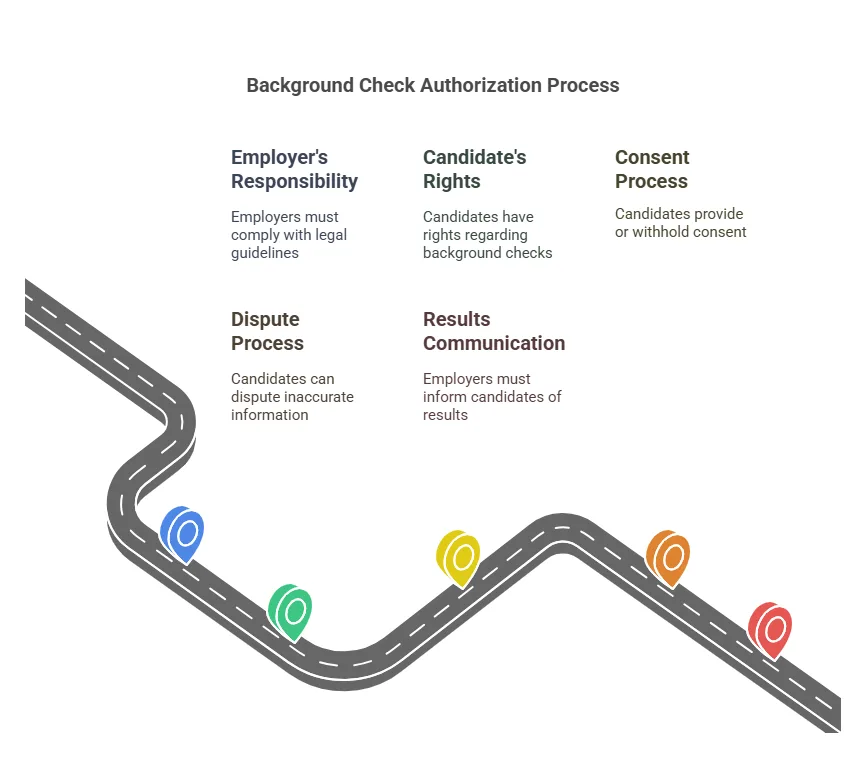How to Complete a Background Check Authorization Form

What is a Background Check Authorization Form?
A Background Check Authorization Form is a document that employers or organizations require job applicants or candidates to sign, giving their consent to undergo a background screening process. This form is essential for legally obtaining information about the candidate’s criminal history, credit history, employment history, and other personal records necessary to evaluate their qualifications for employment, tenancy, or other purposes.
The form ensures that the individual is fully aware of the information being collected and consents to the process before it begins. Employers, landlords, and other entities conducting background checks rely on these forms to comply with various legal requirements, ensuring that the screening process is conducted transparently and ethically.
Purpose of the Background Check Authorization Form in the Background Screening Process

The main purpose of the Background Check Authorization Form is to obtain explicit consent from the candidate before conducting any form of background check. This authorization:
- Protects Candidate Privacy: The form ensures that the candidate’s personal information, including criminal records, credit history, and other private details, is only accessed with their consent.
- Ensures Legal Compliance: In many jurisdictions, obtaining explicit consent is not just a best practice but a legal requirement. The form ensures compliance with laws like the Fair Credit Reporting Act (FCRA), which mandates that employers inform and obtain written consent from the candidate before conducting background checks.
- Prevents Liability Issues: Employers who fail to obtain proper authorization may face legal repercussions, including fines and lawsuits. The authorization form helps mitigate the risk of claims that personal information was accessed without permission.
- Informs the Candidate: By signing the form, the candidate is made aware of the scope of the background check, the types of information that will be examined, and how the data will be used.
Why Employers Must Obtain Authorization Before Conducting Background Checks
It is necessary for employers to obtain authorization from candidates before conducting background checks to ensure they are acting within the bounds of the law and respecting the candidate’s rights. Here are a few key reasons:
- Legal Obligation: The Fair Credit Reporting Act (FCRA) and various state-specific laws require employers to notify candidates about background checks and to get their written consent before initiating the process. Failing to do so can result in significant legal penalties.
- Transparency and Trust: By obtaining authorization, employers create an atmosphere of transparency with candidates. This fosters trust and ensures that the hiring process is conducted fairly and openly.
- Ethical Responsibility: Employers have an ethical responsibility to protect the privacy and dignity of candidates. Conducting a background check without consent would violate that responsibility and could damage the reputation of the organization.
- Ensuring Accuracy: The authorization form ensures that the candidate has an opportunity to dispute any inaccurate or outdated information found during the background check, promoting fairness in the hiring process.
What Information is Typically Included in a Background Check Authorization Form?

A Background Check Authorization Form typically includes several key components that inform the candidate about what information will be collected and how it will be used. Some of the most common sections in the form include:
- Personal Information: The form will ask for basic details such as the candidate’s full name, address, social security number, date of birth, and other identifying information to ensure accurate background checking.
- Scope of the Background Check: This section outlines the specific areas that will be investigated during the background check, such as:
- Criminal history: Whether the individual has any prior criminal convictions or arrests.
- Credit history: A report of the candidate’s financial responsibility and whether they have any debts or bankruptcies.
- Employment history: Verifying the candidate’s past employment records, including previous job titles, dates of employment, and reasons for leaving.
- Education history: Verifying the candidate’s academic background, including schools attended and degrees earned.
- Other checks: Depending on the nature of the position, additional checks may include driving records, drug testing, or social media screening.
- Authorization and Consent: This section is where the candidate explicitly agrees to the background check. They must provide their signature and date, indicating that they understand the process and give their permission for the background check to take place.
- Disclosure of Information: The form may disclose whether the employer plans to use a third-party background screening agency to conduct the background check. If so, the candidate will be informed of the agency’s role in the process.
- Candidate Rights: The form should also include information on the candidate’s rights, such as the right to dispute inaccurate information found in the background check report.
- Acknowledgment of Fairness and Compliance: Candidates are typically asked to acknowledge that the employer is complying with applicable laws, such as the FCRA, and will use the background check results in a fair and non-discriminatory manner.
How the Background Check Authorization Form Works & Its Benefits
Step-by-Step Process of Filling Out and Submitting a Background Check Authorization Form
The process of filling out and submitting a background check authorization form is straightforward, but it’s important to ensure accuracy and adherence to legal requirements. Here’s how the process generally works:
- Receiving the Form: The employer provides the background check authorization form to the candidate. This may be provided in person, via email, or through an online platform, depending on the employer’s preferred method of communication.
- Completing the Form: The candidate fills out the form with their personal information, including name, address, date of birth, and other relevant details. They must also check the boxes indicating the types of background checks they consent to (e.g., criminal, credit, employment history).
- Reviewing the Disclosure: The candidate reads the disclosure statement regarding how their information will be used, ensuring they understand the scope of the background check and their rights under the law.
- Signing the Form: After reviewing the form, the candidate signs it to give their authorization for the background check to proceed. The signature indicates that they agree to the screening and understand the process.
- Submitting the Form: Once signed, the candidate submits the form back to the employer. This may be done in person, electronically, or via a third-party service depending on the employer’s procedures.
- Processing the Background Check: Upon receiving the signed authorization, the employer or a third-party background check agency proceeds with the investigation based on the agreed-upon scope (e.g., criminal record check, credit report).
- Reviewing the Results: Once the background check is completed, the employer reviews the findings and may use the results to make an informed hiring decision. If there are discrepancies or issues with the information found, the candidate may be given an opportunity to dispute it.
Legal Implications of the Authorization Process and the Candidate’s Rights

The Background Check Authorization Form has several legal implications for both employers and candidates. It’s important for both parties to understand their respective rights and responsibilities:
- Employer’s Responsibility:
- Compliance with the FCRA: Employers are required to follow the rules set forth by the Fair Credit Reporting Act (FCRA) when conducting background checks. This includes obtaining written consent from the candidate, providing them with a copy of the report if any adverse action is taken, and allowing them to dispute inaccurate information.
- Non-Discriminatory Use: Employers must ensure that they are not using background checks in a discriminatory manner. This includes adhering to Equal Employment Opportunity Commission (EEOC) guidelines and ensuring that background checks are used fairly across all applicants.
- Candidate’s Rights:
- Right to Consent: A candidate has the right to give or withhold consent for a background check. Employers cannot proceed with a background check without this authorization.
- Right to Dispute Information: If a candidate believes that the information found during the background check is inaccurate, they have the right to dispute the findings.
- Right to Know the Results: If the employer decides not to hire the candidate based on the results of the background check, they must provide the candidate with a copy of the report and allow them time to respond before making a final decision.
Benefits of Using a Background Check Authorization Form
Both employers and candidates benefit from using a Background Check Authorization Form, which ensures the process is transparent, compliant, and fair:
- For Employers:
- Legal Compliance: By using the authorization form, employers ensure that they are complying with federal and state laws, protecting them from potential lawsuits or penalties.
- Streamlined Process: The form simplifies the process of obtaining consent, making it easier to conduct background checks while maintaining transparency.
- Consistency: Using a standardized form ensures that all candidates are treated equally and consistently throughout the screening process.
- For Candidates:
- Transparency: The form informs candidates about what information will be checked and how it will be used, which can reduce anxiety and foster trust.
- Protection of Rights: The form ensures that the candidate’s consent is obtained before any background check is conducted, and that their legal rights are respected throughout the process.
- Dispute Resolution: If the background check reveals inaccuracies, the candidate has the opportunity to address and resolve any discrepancies in the report.
Precise Hire: Simplifying the Authorization Process
At Precise Hire, we offer seamless and efficient background screening services that simplify the background check authorization process for both employers and candidates. Our platform ensures compliance with legal regulations and helps you manage background check requests quickly and efficiently. With our user-friendly tools, you can streamline the authorization process, track submissions, and receive accurate reports that help you make informed decisions.
Legal Aspects, FAQs, and Conclusion
Legal Aspects of Background Check Authorization
The background check authorization process must comply with several important legal guidelines to ensure fairness, transparency, and respect for candidate rights:
- Fair Credit Reporting Act (FCRA): The FCRA requires employers to obtain written consent from candidates before conducting a background check, provide candidates with a copy of the report, and allow them to dispute inaccurate information.
- Equal Employment Opportunity Commission (EEOC): The EEOC guidelines require employers to use background checks in a non-discriminatory manner, ensuring that individuals are not unjustly excluded from employment opportunities based on their criminal history, credit, or other protected characteristics.
- State-Specific Laws: In addition to federal regulations, employers must also comply with state-specific laws governing background checks, such as ban the box laws, which restrict the timing of background checks in the hiring process.
FAQs About Background Check Authorization
What should I do if my background check results are inaccurate?
You have the right to dispute any inaccuracies found in your background check by contacting the reporting agency and providing supporting evidence.
Can an employer conduct a background check without my consent?
No, employers cannot conduct a background check without your explicit written consent. If they do, they could face legal consequences.
How long does it take to complete a background check?
The time it takes to complete a background check varies depending on the scope of the check, but it typically takes anywhere from a few days to a couple of weeks.
What happens if I refuse to sign the background check authorization form?
If you refuse to sign the authorization form, the employer cannot proceed with the background check, and it may impact their hiring decision.
Conclusion
The Background Check Authorization Form is a critical component of the background screening process, ensuring that both employers and candidates are aware of their rights and responsibilities. By obtaining explicit consent from candidates, employers maintain legal compliance and promote transparency in the hiring process. For candidates, the form ensures privacy protection, clarity, and the ability to dispute inaccurate information. By using Precise Hire for background screening, you can streamline the process and ensure full legal compliance, helping you make well-informed hiring decisions while respecting the rights of all applicants.
